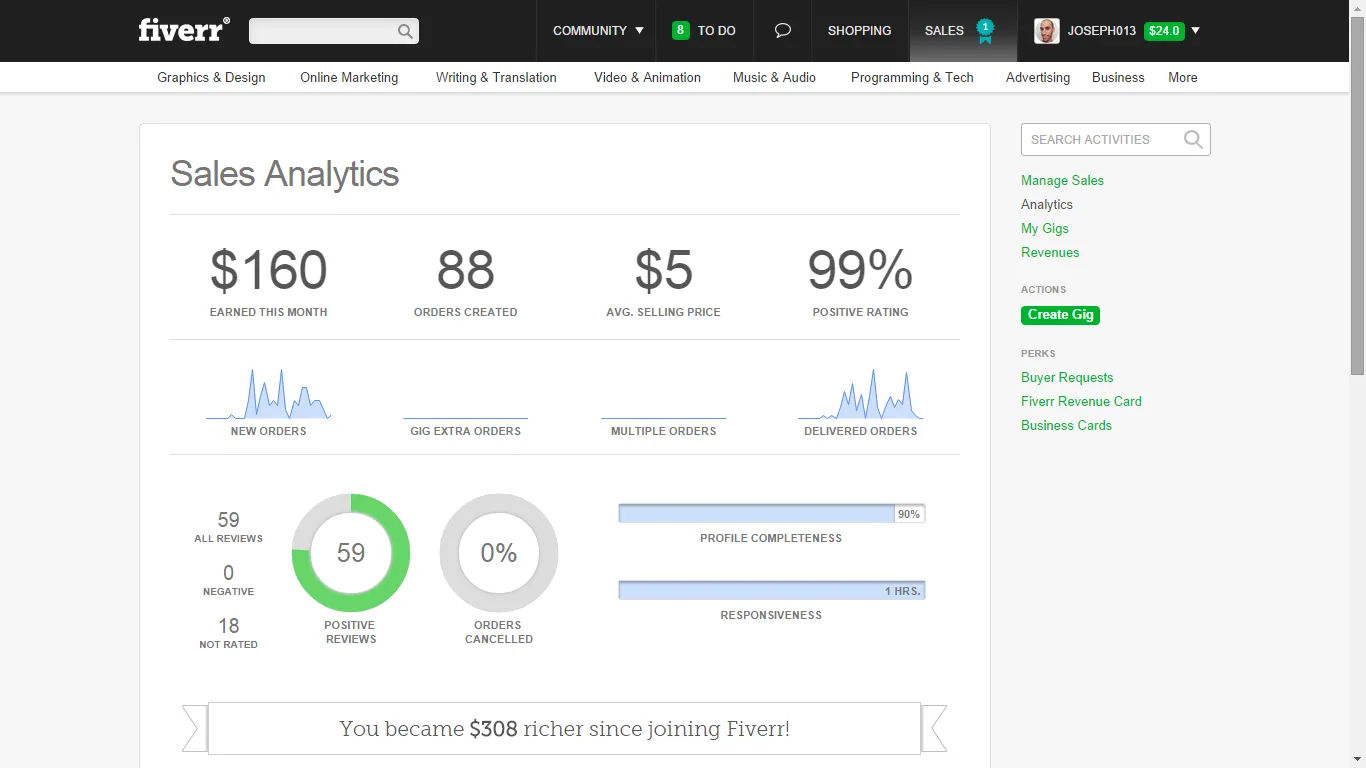So, you've started earning money on Fiverr! That's fantastic news! However, as exciting as it is to make extra cash on the side, it also brings along the responsibility of reporting that income for tax purposes. Navigating tax laws can feel daunting, especially if you're new to the freelancing world. In this guide, we'll walk you through everything you need to know about reporting your Fiverr income accurately. Let's make tax time a breeze!
Understanding Fiverr Income

First things first—let's break down what Fiverr income actually is. When you offer services on Fiverr, be it graphic design, writing, or digital marketing, any revenue you generate is considered income. Here are some key points to keep in mind about your Fiverr earnings:
- Income Types: Fiverr income primarily comes from gigs you offer. This includes the total payment received, including tips and bonuses. It’s worth noting that Fiverr deducts its service fee from each transaction, so make sure you’re accounting for the net amount received.
- Payment Frequency: Fiverr pays you after an order is marked as complete, usually within 7 days. Keep track of these payments, as they need to be reported for tax purposes.
- Supporting Payments: If you receive income through other methods, like PayPal or direct bank transfers, those should also be considered. Essentially, any money you make from services must be reported.
- Foreign Income: If you have clients from other countries, that income is still reportable as part of your total earnings regardless of where the money comes from.
Understanding how your Fiverr income works is crucial for accurately reporting it during tax season. By keeping detailed records and understanding the types of income you receive, you can ensure that you're prepared come tax time.
Also Read This: Best 10 Fiverr Gigs for SEO Services in 2024
Why Reporting Income is Important

When you’re earning money through platforms like Fiverr, it’s essential to understand the importance of reporting your income accurately. Failing to report your earnings can lead to some serious repercussions, which you definitely want to avoid.
First and foremost, let’s talk about legal obligations. Most countries require that you report all sources of income, and Fiverr earnings are no exception. Whether you’re working as a freelancer, gig worker, or small business owner, *the law demands that you declare your earnings. Ignoring this obligation can lead to hefty fines and even legal trouble, which no one wants!
Secondly, reporting your income ensures that you are contributing to social services and government programs. Taxes collected from businesses and individuals help fund essential services like healthcare, education, and infrastructure. By reporting your income, you are playing your part in community support and development.
Additionally, declaring your earnings can give you access to various tax deductions and credits. If you have documented your income and expenses well, you could potentially lower your tax liability. Here are some benefits:
- Transparency: Establishes your credibility with tax authorities.
- Offsets expenses: Deductions can lessen the tax burden.
- Financial history: Helps you build a solid reputation if you need loans or mortgages.
In essence, reporting your Fiverr income keeps you compliant with the law while also opening up avenues for financial benefits.
Also Read This: What is the Fiverr App?
Gathering Your Income Records

Gathering your income records might seem like a daunting task, but it doesn’t have to be! In fact, organization is key when it comes to managing your finances. Here’s how you can effectively collect all the necessary documentation to report your Fiverr income accurately.
First things first, make sure you keep track of every transaction. Fiverr provides detailed earnings reports, which are invaluable for this purpose. You can download your earnings summaries directly from your Fiverr account. Here’s what you should focus on:
| Record Type | Description |
|---|---|
| Invoice | Any invoices you’ve sent to clients for services rendered. |
| Earnings Report | Your Fiverr earnings summaries detailing monthly income. |
| Transaction Emails | Email notifications from Fiverr regarding payments received. |
| Bank Statements | Statements showing deposits from Fiverr to your account. |
Consistency is key!* Set up a specific folder (physical or digital) where you can stash all relevant documents. This can include:
- Contracts or agreements with clients
- Receipts for expenses related to your Fiverr work
- Record of any refunds or disputes
Finally, consider utilizing accounting software or spreadsheets to keep track of your income and expenses. Tools like QuickBooks or even simple Excel sheets can make this task seamless and efficient. By gathering your documents and keeping everything organized, you’re setting yourself up for a stress-free tax season!
Also Read This: Unlocking Business Potential: What Services Can Fiverr Provide for My Business?
Determining Your Tax Obligations
When it comes to reporting income earned through Fiverr, understanding your tax obligations is crucial. The first step is to recognize that any income you earn is generally subject to taxation, regardless of whether you're classified as a freelancer or a business entity. In the United States, the IRS classifies income into several categories, and Fiverr earnings are typically considered "self-employment income."
Here's a brief rundown of what you should keep in mind:
- Self-Employment Tax: If you're a U.S. citizen and earn more than $400 from Fiverr in a year, you’re required to pay self-employment tax. This includes Social Security and Medicare taxes.
- Federal Income Tax: Any profits you make will also be subject to federal income tax. Make sure you keep track of all your earnings and the associated expenses to calculate your net taxable income accurately.
- State Income Tax: Depending on your state, you may be required to pay state income tax on your Fiverr earnings as well. Each state has different regulations, so it’s a good idea to review your local laws.
Don't forget, legitimate business expenses can often be deducted, which may reduce your overall tax liability. These can include anything from software subscriptions and equipment to internet costs. Keeping meticulous records will help you claim these deductions come tax time!
Also Read This: Unlocking Success on Fiverr: Strategies for Growth Beyond Level Status
Step-by-Step Guide to Reporting Fiverr Income
Reporting your Fiverr income might seem overwhelming, but breaking it down into steps makes it much easier. Here's a straightforward guide to ensure you comply with tax regulations:
- Gather Your Earnings: Collect all your receipts, invoices, and statements from Fiverr. You can easily find your total earnings through your Fiverr account dashboard.
- Document Your Business Expenses: Make a list of all the expenses related to your Fiverr gigs. This includes tools, marketing, and any other business-related costs.
- Calculate Net Income: Subtract your total expenses from your Fiverr earnings to determine your net income. This figure is what will be taxed.
- Fill Out the Right Forms: If you're in the U.S., freelancers typically use the Schedule C (Form 1040) to report profits or losses from their businesses. Don’t forget to also include Schedule SE for self-employment tax.
- File Your Taxes: You can either file your taxes by yourself using tax software or hire a tax professional. Just ensure you meet the filing deadlines to avoid penalties!
Follow these steps, and you'll be well on your way to accurately reporting your Fiverr income. And remember, staying organized throughout the year can make this process a breeze when tax season rolls around!
Also Read This: How Much Should I Charge as a Freelancer
7. Common Deductions for Fiverr Income
When it comes to reporting your Fiverr income, it’s not just about the money you made; it's also about what you can deduct. Understanding the common deductions available to you can significantly reduce your taxable income, ultimately saving you money come tax season. Here are some key deductions you might consider:
- Business Expenses: Any costs directly related to running your Fiverr business can be deducted. This includes things like software subscriptions, marketing costs, and website hosting fees.
- Home Office Deduction: If you use a part of your home exclusively for your Fiverr work, you might be able to deduct a portion of your rent or mortgage, utilities, and internet costs. Make sure to calculate the square footage of your home office compared to your entire home.
- Equipment and Supplies: If you purchase a new computer, camera, or other tools specifically for your Fiverr gigs, those expenses are deductible. Just keep the receipts!
- Educational Expenses: Courses, webinars, or materials that improve your skills for better performance on Fiverr can often be deducted. This could include everything from graphic design courses to creative writing workshops.
- PayPal Fees and Service Charges: Any fees associated with receiving your payments through platforms like PayPal or Fiverr will add up. These transactional costs are tax-deductible.
Always keep thorough records and receipts of your expenses. This documentation will make it much easier when it comes time to file your taxes and defend your deductions if ever questioned by the IRS.
Also Read This: When Fiverr Started: A Journey Through the Evolution of Freelancing
8. Filing Your Taxes: Tips and Best Practices
Filing your taxes as a Fiverr freelancer can seem daunting, but with the right tips and best practices, you can navigate it with confidence. Here are some handy suggestions to streamline the process:
- Stay Organized: Keep track of earnings and expenses throughout the year. Use accounting software or spreadsheets to document your income and any deductions you're claiming. This will save you lots of headaches later on!
- Know Your Deadlines: Familiarize yourself with tax deadlines specific to your situation—especially if you're a freelancer. Missing deadlines can lead to penalties.
- Consider Estimated Taxes: As a self-employed individual, you may need to pay estimated taxes quarterly. Make sure you're setting aside enough of your earnings throughout the year to cover this.
- Seek Professional Help: If your financial situation is complicated, consider hiring a tax professional who understands freelance income. They can ensure you're maximizing deductions and complying with tax laws.
- Use Reliable Tax Software: If you prefer to do it yourself, opt for reputable tax software specifically designed for freelancers. These tools often have features that guide you through the filing process efficiently.
Ultimately, taking the time to understand how to properly report your Fiverr income for taxes can make a huge difference in your financial health. Being diligent and informed will not only save you time but also help you avoid costly mistakes!
Also Read This: What Freelance Translators Earn
9. Resources for Tax Assistance
When it comes to managing your finances as a Fiverr freelancer, understanding how to report your income for taxes can seem daunting. Luckily, there’s a wealth of resources out there to guide you through the intricacies of tax reporting. Let’s explore some reliable options:
- IRS Website: Start with the official IRS website. This site is packed with essential information about tax laws, forms, and guidelines specifically for freelancers.
- TurboTax: If you’re looking for a user-friendly tax software, TurboTax is a popular choice among freelancers. They offer step-by-step guidance to help you maximize deductions and file accurately.
- CPA Services: Hiring a Certified Public Accountant (CPA) can be a game-changer. They provide tailored advice and can help you navigate complex tax structures. Look for professionals who specialize in freelance tax laws.
- Online Tax Communities: Joining forums and communities such as Reddit’s r/freelance can connect you with fellow freelancers. These platforms often share advice and experiences that can enlighten you.
- Books and E-Books: There are various books dedicated to freelancing and tax reporting. Titles like The Freelancer's Guide to Taxes offer valuable insights into specific deductions and strategies.
Don’t hesitate to take advantage of these resources; they can save you both time and money during tax season!
10. Conclusion
As a Fiverr freelancer, navigating the tax landscape might feel overwhelming at first. However, once you grasp the basics of reporting your income, you'll find that it becomes a manageable and even straightforward process. Remember, the IRS sees freelance work much like any other employment; it's just about how you choose to report it.
In summary, keep these key points in mind:
- Track your income meticulously as well as any deductions you can claim.
- Understand whether you need to pay estimated taxes quarterly.
- Make use of available resources, from IRS guides to professional CPA services.
Ultimately, being proactive and informed will not only help you stay compliant but can also optimize your financial situation as a freelancer. Tax time doesn't have to be stressful—empower yourself with knowledge and resources, and you'll tackle it like a pro!



